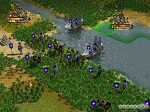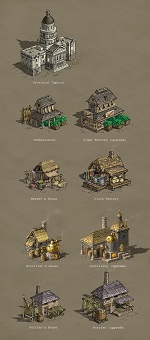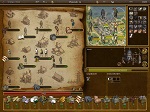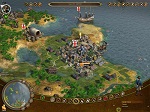Civilization IV: Colonization Info Center
Introduction
Welcome to the info center for Colonization! Whether you are new to the Civilization series or a returning veteran, the information below will hopefully enhance your understanding of this latest game. All known details are collected in the categories below, and, as always, this article is being updated constantly. Also, note that most thumbnails can be clicked, taking you to the Gallery.
 Article Navigation
Article Navigation
- Introduction
- Overview
- Game Features
- Technical Info
- Empire Management and the Economy
- Foreign Affairs
- Civilizations and Leaders
- Units and Combat
- City Management and Buildings
- The Environment and World
- Victory Conditions
- Audio and Video
- Previews
- Article Information and History
- Related Links
Overview
Announced on June 9th, 2008, Civilization IV: Colonization is a standalone expansion pack for the award-winning game Civilization IV. This game, a remake of the 1994 classic Sid Meier’s Colonization, utilizes the Civ4 engine but does not require that any other previous Civ4 games (including the expansion packs) are installed. Thus, Colonization both incorporates some elements of standard Civilization IV gameplay while introducing some of its own. Some concepts from the 1994 version are also used to create a game with a balance of old and new.
Civilization IV: Colonization, like the classic, focuses on the European discovery and later colonization of the New World. Leading one of the major European powers, players will engage in diplomacy, exploration, trade, and, of course, warfare, as they struggle to dominate the newly found territories. Additionally, historical elements, like important people and revolutions, are also in place to create a realistic environment for players to control history and their countries’ future.
Game Features
Here are the official features, as written on Firaxis’ website:
- Classic Game Design Rebuilt for the Modern Era: Usher forth a new generation of Sid Meier’s Colonization with gameplay built on the award winning Civilization IV engine, providing the beautiful visuals, famously addictive gameplay and endless fun that are synonymous with Sid Meier strategy games.
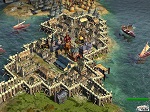
- Fight the Homeland and Establish a New Nation: Play as the English, Spanish, French or the Dutch and journey to a brave new world in search of freedom from your oppressive homeland
- Improved Diplomacy: Sustain peace and support your followers as you engage in advanced negotiations with natives, other colonists and the hostile homeland — Trade resources, gold and land as you build the foundation for a self sufficient and powerful colony
- Historical Figures Provide Adaptive Gameplay: Acquire founding fathers such as John Smith, Patrick Henry and Samuel Adams whowill help guide your nation to freedom based on your gameplay style
- Brand New Interface: Both Civilization IV fans and players new to the series will feel right at home with an interface that Firaxis has built to be accessible and easy to navigate.
- Multiplayer Offers Endless Replay Value: Compete with friends from all over the world via the Internet and Play by Email modes or compete locally via the Hotseat and LAN modes, offering endless ways to conquer the New World.
- Detailed Tutorial Guides Players In Their Conquest: Civilization IV: Colonization will provide an enhanced tutorial that will help both fans of the game and brand new players on their way to ruling the New World.
- Mods and Community Tools: Players will have limitless options for modifying the game to suit their needs. Firaxis will ship the game with modding tools including a map editor using XML and Python.
Technical Info
- Colonization is being developed by Firaxis Games and published by 2K Games, which is part of the overall company Take-Two Interactive. This is just like the previous Civilization 4 core game and expansions. Similarly, the design team behind Beyond the Sword, the latest expansion, led by Alex Mantzaris and Jon Shafer is also in charge of Colonization’s development.
- The game is slated for a September 22, 2008 release date in North America and September 26, 2008 elsewhere as part of the Games for Windows program.
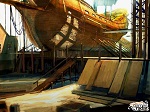
- It currently has been rated Everyone 10+ by the ESRB, the Entertainment Software Rating Board. For reference, Civ4 was rated E 10+.
- The system requirements different from regular Civilization IV: Beyond the Sword are: a graphics card with Pixel Shader 1.1 support. This increased requirement for video cards is due to the noticeable enhancement of water graphics, foliage, and terrain. The full system requirements are as follows:
- MINIMUM SYSTEM REQUIREMENTS
Operating System: Windows(r) 2000/XP/Vista
Processor: 1.2 GHz Intel Pentium 4 or AMD Athlon processor or equivalent
Memory: 512 MB RAM
Hard Disk Space: 900 Megs Free
CD-ROM Drive: 4X Speed
Video: DirectX 9.0c-compatible 64 MB video card with Shader 1.1 Support
or better
Sound: DirectX 9.0c-compatible sound card
DirectX(r): Sid Meier’s Civilization IV: Colonization DirectX(r) version
(included on game disc) - RECOMMENDED SYSTEM REQUIREMENTS
Operating System: Windows(r) 2000/XP/Vista
Processor: 1.8 GHz Intel Pentium 4 or AMD Athlon processor or equivalent
Memory: 1 GB RAM
Hard Disk Space: 900 Megs Free
CD-ROM Drive: 4X Speed
Video: 128 MB Video Card w/ DirectX 9 support (pixel & vertex shaders)
Sound: DirectX 9.0c-compatible sound card
- MINIMUM SYSTEM REQUIREMENTS
- There is a totally redesigned interface, as well as new music that is different from the core Civ4 soundtrack. Of particular note is the city interface, which emphasizes trade and the allocation of specialists.
- Like Civ4, Colonization contains its own Civilopedia that covers over thirty topics, from immigration to war and beyond.
- There are various multiplayer modes: Direct IP, LAN, Play by Email, Internet, and Hotseat. Games can contain up to eight people, meaning that two players can simultaneously control the same colony and work cooperatively.
- Seven difficulty levels and four game speeds (Quick, Normal, Epic, and Marathon) allow players to find the settings that give them the most compelling experience and provide an adequate amount of challenge. In the Custom Game menu, there are also three victory conditions (Independence, Victory, and Time) which can be enabled or disabled. The Advanced Start feature, like in Civilization 4, allows you to begin the game with some degree of development in place.
Empire Management and the Economy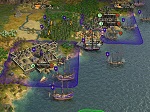
- The game begins with simply a ship in the middle of the ocean, with a pioneer and soldier on board. You must sail and explore to find an island where you can make landfall and establish a colony. As you collect and harvest resources, you will acquire enough so that you can send it back to your mother country on a ship to sell. If you have your mother country transport treasure units by itself, they will take a portion of the proceeds. On the other hand, transporting it yourself is slower, but more prosperous.
- In order to found a new colony with a pioneer, you must either pay the natives gold or fight them to take the land by force. Once you have multiple colonies set up, you can trade between them with a trade wagon to coordinate your colonies’ efforts and specialize production of raw and refined goods. All refined goods sell at a higher price, bringing in more profits. For example, rum distilled from sugar is more valuable than the sugar itself. Similarly, a master furrier can take animal furs and turn them into expensive coats for sale.
- The resource “liberty bells” symbolize your independence, and, as you acquire more and more of them, you gain benefits from members of your Continental Congress who become recruited. Such “founding fathers” represent historical figures. These people might increase your sugar productivity, for example, affecting rum production. In total, there are 52 founding fathers, and only one civilization can receive each one and their associated bonus. Betsy Ross boosts garment production, and others have similar specific benefits. These founding fathers are somewhat like Civ4’s system of world wonders, providing noticeable increases to individual civilizations. Founding fathers are more likely to join colonies that focus on their ideals: building cathedrals in the New World will attract religious founding fathers as an example. Here is a list of founding fathers:
| Name | Benefit |
| Vasco Nunez de Balboa |
+25% Defense in all settlements |
| Lord Baltimore |
Increases crosses production by the tax rate |
| Juan de Bermudez |
+1 movement for Caravel, Galleon, and Merchantman |
| Pedro Alvares Cabral |
-50% travel time to Europe |
| Bartholeme ds las Casas | +50% native conversion rate from missions |
| Hernan Cortes |
Free Stockade in every settlement |
| Diego Velazquez de Cuellar | Provides 3 Indentured Servants |
| Gregorio de Mattos e Guerra | +2 Liberty Bells per Church +3 Liberty Bells per Cathedral |
| Alexander Hamilton |
+3 hammers per Town Hall |
| John Harvard |
Free Schoolhouse in every settlement |
| Patrick Henry | unknown |
| Thomas Hooker | Provides 3 Jesuit missionaries |
| Sor Juana |
+3 crosses per Church and Cathedral |
| Gabriel Lallemant | 50% faster production of Churches and Cathedrals |
| Juan Ponce de Leon |
2 times as likely to get Treasure from Ancient Ruins |
| Paul Chomedey de Maisonneuve | Free Formation Promotion for Gunpowder Units +1 movement for Converted Natives |
| William Penn |
+3 crosses per Town Hall Strengthens relations with natives |
| Pocahontas | Strengthens relations with natives |
| Gonzalo Jimenez de Quesada |
Reveals all tiles with Burial Grounds and Ancient Ruins |
| Adam Smith | 50% faster production of Textile Mill, Coat Factory, Rum Factory, and Cigar Factory |
| Martha Washington | unknown |
| Eli Whitney |
+50% cotton production in all settlements |
| Roger Williams | +25% native conversion rate from missions Strengthens relations with natives |
- Once independent, you must determine the future of your government and constitution by making a series of decisions, presented in two differing options. For example, you will have to determine whether you support or reject slavery, the separation of church and state, and representation. This allows for various types of governments that can be set up, from representational democracies to mimic history, or even theological monarchies! Your decisions will have an impact on your colonies, as well. Rejecting slavery will increase the population of each of your settlements, as an example.
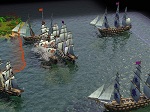
- You can gain new citizens to your colonies either by immigration (from willing people or ones that you have paid) or random event (some type of circumstance in the mother country that causes people to leave, like a workers’ strike or religious persecution). Immigration can lead to problems if you accept the presence of individuals like criminals. However, buildings like churches can gradually attract better quality immigrants.
- There is no technology tree like in normal Civ4. In fact, because of the relatively short timespan covered in the game, civilizations have access to all units and buildings that remain constant even as the colonies expand.
Foreign Affairs
-
- The natives can help train your unskilled colonists so that they can become farmers or planters. Additionally, natives may offer you gifts like beads or gold, assuming you maintain good relations. You can also send missionaries to live with the natives, in hopes of converting them or acquiring knowledge about fishing or farming, among others. If relations sour, natives may fight back against you, steal your weapons, and raid your colonies to kill colonists. If you maintain good relations, the natives may help you fight other colonies or even give your their settlements nearby. The best way to stay friendly is to not intrude on their land and to obey their chief’s requests.
- Confirmed native tribes include the Aztecs, Arawak, Sioux, Cherokee, Incan, Tupi, Iroquois, and Apache. The Incans and Aztecs’ cities provide 4x treasure when you capture them.
- Your mother country’s government can try to control your economy by imposing a tariff, or a tax on your goods, giving you the opportunity to either obey it or resist, a move which could lead the government to stop accepting imports of that resource from your colonies. Similarly, consistenly resisting your mother country will lead to increased troop presence in the colonies and potentially higher taxes, limiting your profits.
- Diplomacy with both other colonists and natives is possible, including the ability to trade and form treaties. In the beginning, relations start out favorable, but if you try to expand, relations, especially with the natives, will grow more tense.
- The diplomatic bargaining table now employs drag-and-drop trading, meaning you can drag items to trade instead of clicking on items individually as in Civ4. This aims to speed up diplomacy and make it more fluid.
Civilizations and Leaders
The are four different civilizations in Colonization, each with their own particular focus. This emphasis gives a special bonus to each civilization that allows them to succeed in unique ways, allowing them to produce things faster or stabilize their economy. In addition, each civilization is led by two historical figures who had an influential role during this time period. Leaders have a trait that is common to the civilization and shared by that country’s leaders in addition to a unique ability. In the following table, you can see the information associated with each civilization.
| Civilization | Leaders | Traits | Bonuses |
| The English | George Washington | Tolerant Disciplined |
-25% crosses need for immigration -50% soldier equipment required |
| John Adams | Tolerant Libertarian |
-25% crosses need for immigration +25% Liberty Bells in all settlements |
|
| The French | Samuel de Champlain | CooperativeEnterprising | Natives are more tolerant towards territory encroachment and -50% time spent living among natives to learn a new skill +100% native conversion rate from missions |
| Louis de Buade de Frontenac | CooperativeMilitaristic | Natives are more tolerant towards territory encroachment and -50% time spent living among natives to learn a new skill Free promotion (Grenadier I) for certain units |
|
| The Dutch | Peter Stuyvesant | Mercantile Industrious |
Market prices are less sensitive +25% hammers in all settlements |
| Adriaen van der Donck | Mercantile Charismatic |
Market prices are less sensitive +100% time between tax increases |
|
| The Spanish | Simon Bolivar | Conquistador Determined |
+25% versus natives +100% effect of Liberty Bells on rebel strength |
| Jose de San Martin | Conquistador Resourceful |
+25% versus natives -50% XP needed for unit promotion |
Units and Combat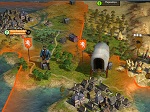
- “Master” units, like master scouts or master tobacco farmers, get bonuses compared to regular units which can be formed by assigning a colonist to become a certain occupation or profession. The natives can even upgrade your units to types that cannot be recruited from the Old World, like master sugar farmer, making relations with the natives more important. However, any unit has the potential to be upgrade into any other type of unit. Maintaining similar types of professions, however, is more effective. Natives can even be converted and given professions or be made soldiers.
- Using veteran soldiers, instead of ordinary colonists assigned to fight, in combat provides a bonus of 10% to their strength and allows them to gain experience at a faster rate.
- Privateers, a type of naval unit, allow players to engage opponents on the seas without formally declaring war. In fact, because these ships do not carry the flag of their owner, the enemy will not even know which country attacked them! This can be a lucrative business that directly undermines the competing colonies.
- Training units in the New World, as opposed to recruiting them from the Old World with profits obtained from selling goods and manufactures, will be more time-consuming. Sending units to schools and college as a way of specializing your workforce can increase productivity. You must first establish the necessary infrastructure and improvements before building your own units in the colonies.
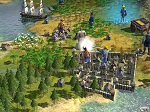
- Once you declare your independence, you will face an onslaught of units from your mother country and must fight them in order to defend your freedom. These foreign troops will be stronger and better trained, meaning you must consciously focus on building up your defenses before taking the plunge and separating from the homeland.
- Known units include: pioneers, scouts, soldiers, dragoons, artillery, cannons, caravels, privateers, frigates, and various types of farmers. There are also numerous promotions, including ones not found in Civ4.
- In one preview’s revolution, the mother country’s force included 57 soldiers, 16 dragoons, 13 artillery, and 10 warships.
City Management and Buildings
- Colonists can harvest raw resources and refine them in the colonies: cotton can become cloth and tobacco, which
can be made into cigars for export. Similarly, blacksmiths can make tools from iron ore to create an independent supply of weapons and equipment. - Attracting master workers (planters, blacksmiths, harvesters, etc.) from the Old World helps increase productivity and efficiency, as does upgrading buildings (say, from a Weaver’s House to a Cloth Factory). However, recruiting experienced experts from the Old World is very costly and sometimes it is more wise to try to establish relations with the natives in order to acquire such skills.
- There are four ways to attract new colonists: collect a set number of food (for Normal game speed, 200), buy them from the Old World, convert natives using missionaries, or entice immigrants from the Old World by developing your churches and cathedrals (growing your production of the resource “Crosses”).
- For the interface during a revolution, there is a display that indicates current friendly and enemy troop levels in cities, allowing you to easily see where your colonies are in dire need.
- You can assign a city’s population to either work in the surrounding tiles, harvesting raw resources and materials, or in buildings and city improvements where those resources are manufactured into goods. Each building can be filled with a certain amount of workers.
- Known benefits of buildings include the following: docks allow more goods to be imported and exported, churches attract religious immigrants, and warehouses allow you to store a greater amount of goods.
- There are still various levels of automation to reduce micromanagement. For example, the placement of specialists and creation of trade routes can be handled by the computer, allowing you to focus on more interesting aspects.
The Environment and World
- The world begins undiscovered as you start out on a lone caravel in the ocean. Similarly, the other civilizations also have their origins in a ship which must make landfall somewhere in order to found the first colony.
- Cultural borders only appear for the European colonies, and not natives. Instead, their settlements simply appear on the map on individual tiles without any extending influence. Additionally, there is no longer any limitation as to how close cities and settlements can be: they can be right next to each other on adjacent tiles!
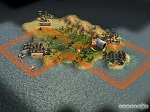
- Both historical and randomly generated maps have been included. Random maps will mimic North and South America from pole to pole, including a narrow stretch similar to the Panama region, whereas historical maps will be accurately detailed. The premade historical maps are of the Northwest Passage, Western Hemisphere (normal and huge), and South America. Random map scripts include a New World one as well as a Caribbean script, a setting that produces a region filled with water and islands. The map size is similar to that of a normal Civ4 map.
- Resources, which play a key part in the game, form the basis of your economy. Known resources include tobacco, lumber, sugar, cotton, silver, furs, ore, and food.
- The lands surrounding your colonies may contain hidden treasures which you can load onto ships to return to the Old World. A key part of the game involves exploration of nearby territories to find resources that can be harvested for trade and profit.
- You can expand your colonies’ borders by assigning citizens to the town hall, which will gradually result in an increased area of terrain under your control.
Victory Conditions
- The overall goal of the game is to win independence from your mother country. This becomes a possibility once your “rebel sentiment” in your colonies is over 50%, something that can be achieved by maintaining a prosperous economy despite your mother country’s attempts to interfere and control. As rebel sentiment increases, your citizens will become more efficient, work harder, and yield more bonuses, like creating guns.
- In order to official win, you must defeat the troops sent by your mother country to retain the colonies. At the same time, you are in a race against the other civilizations to declare and win your independence before them. The size of the opposing army will depend on how well you have treated your mother country: disobeying its commands and ignoring its orders will cause your homeland to be more resilient and forceful. In fact, you can even sink the enemy’s navy as they approach your colonies, saving you the trouble of having to defeat the forces on land!
- The game lasts 300 turns, shorter than a typical Civ4 game. The first turn begins in 1492 AD, the year that Christopher Columbus discovered the New World.
- As in Civ4, there is an end-of-game replay screen that reviews the game from the very first turn to the last, pointing out significant events and the civilizations’ expansion.
Audio and Video
| Title | Description | Length (min:sec) | Source |
| Official Debut Trailer | This video is the official trailer for Colonization. | 1:30 | IGN |
| “Civilization IV: Colonization” with Firaxis Games | This PolyCast, or podcast of fellow gaming site Apolyton, contains a conversation with Mike Bates, Ed Piper, and Jesse Smith, three members of Firaxis’ Colonization team. | 70:35 | Apolyton |
| Interview with Jesse Smith | This video clip is an interview, taped during E3, with Jesse Smith of Firaxis, covering the new features in Colonization. | 2:37 | Gamespot |
| Gameplay Movie 1 | An in-game video, this clip focuses on trade and relations with Europe. | 1:03 | Gamespot |
| Gameplay Movie 2 | A video similar to the one above, this covers the development of your colony. | 1:03 | Gamespot |
| Gameplay Movie 3 | Finally, this third gameplay video details the later part of the game. | 1:03 | Gamespot |
Previews
Many hands-on previews are available for Colonization from the major gaming sites. Below you can find links to them, as well as short excerpts, in chronological order.
- Fidgit – September 16th, 2008 – A series of hands-on game diaries in four parts: PART 1, PART 2, PART 3, and PART 4.
- Gamespot – September 12th, 2008 – “Civilization IV: Colonization is a strategy game more focused on trade and forging new alliances than it is about wiping out natives and competing colonies with musket fire.”
- WorthPlaying – September 3rd, 2008 – “Powerful customization tools let you create exactly the game you want. The game tries to appeal to beginners with extensive tutorial tooltips and a Civilopedia that’s packed with information about how different units and mechanics work.”
- IGN – August 21st, 2008 – “Firaxis has provided us with the details on each faction, from the national monarch who plays a role in the game demanding taxes and tribute from his colony to the faction leaders, which you select to provide bonuses.”
- Gamespy – August 21st, 2008 – “Much of the game involves this fascinating mercantile balancing act — having the right people in the right places to produce the right commodities to generate fat profits on sales trips back to Europe.”
- Gamespot – August 19th, 2008 – “If you’re looking for a challenging Civ experience, Colonization is it. Management plays a much greater role than combat, and you can’t simply fight your way to victory from the very beginning.”
- PALGN – August 18th, 2008 – “The city management screens provide one of the more obvious points of difference. The left hand side of the screen is dedicated to a variety of specialist slots – furriers, blacksmiths, ministers of religion and rum distillers, to name just a few.”
- IGN – August 15th, 2008 – “The New World map creates a landmass that stretches from pole-to-pole, much like North and South America. The Caribbean map eschews the big land mass and goes for large islands.”
- JeuxVideo – August 14th, 2008 – This preview is only available in French.
- VideoGamer – August 14th, 2008 – “Governing the development of a new nation is no easy task, but the game does everything it can to make options and commands as simple as it can – with an emphasis on drag-and-drop for managing trades and assigning colonists to specific jobs.”
- IGN – August 12th, 2008 – “As you could improve the cities in Civilization, you can improve your various colonies by building improvements. For example, a dock will allow you to import and export more goods, a church will lure more religious immigrants, a warehouse will let you stockpile greater amounts of goods, and more.”
- Joystiq – July 29th, 2008 – “The city interface is also quite streamlined and appears intuitive, with players being able to take workers and easily move them to focus on things like trapping or other resource-gathering ventures for the city.”
- GameSpy – July 18th, 2008 – “You have 300 turns to defeat your colonial masters, and if you’re not prepared for this kind of brutal slugfest against a well-armed royal opponent, you’ll lose the game.”
- GameZone – July 18th, 2008 – “The maps, whether you pick a recognizable landscape or get a randomly generated map, are huge in size and the game grows in a very nice visceral manner.”
- NZGamer – July 17th, 2008 – “Your relationship with your home land has also been bumped up, and should provide benefits and responsibilities not unlike those found in the latest Age of Empires. The game will also allow online multiplayer for up to four players.”
- Shacknews – July 16th, 2008 – “With the revolution in full swing, the game’s focus turns towards combat, allowing you to make full use of the war chest built up throughout the earlier years of your colonies and leverage the alliances and pacts made with other factions and native peoples.”
- IGN – July 15th, 2008 – “There are now historical maps as well as randomly generated ones, so if you want to redo the American Revolution with a map of the United States you can.”
- Gamespot – July 15th, 2008 – “Fortunately, declaring independence will at least help you to enlist the aid of the 52 founding fathers, who historically founded the Continental Congress to draft the Declaration of Independence.”
- WorthPlaying – July 8th, 2008 – “When it’s time to declare a revolution, you begin by declaring the principles of the new country you’re trying to found. You aren’t obligated to pattern your nation too closely after America.”
- BigDownload – July 3rd, 2008 – “Properly evolving a friendly relationship with the Native Americans is also instrumental in getting them to voluntarily assimilate their land with yours, an effective method of blossoming your colony.”
- 1UP – June 27th, 2008 – “If you designate a citizen to become a blacksmith while you’re on a tile with some silver or other metal resource, you end up with a surplus of ore that can then be sold or converted into other commodities.”
- AskMen – June 26th, 2008 – “How you deal with your monarch will affect the end game, since your goal is to eventually throw them off and establish independence form them.”
- Gamespot – June 26th, 2008 – “Your resources include tobacco, lumber, sugar, cotton, furs, ore, and food, each important in increasing your population, building new structures, and researching new technologies and farming methods.”
- IGN – June 26th, 2008 – “Your task is to build an economy that supplies you with goods that can be packed away on the sailing ship and sent back to your mother country, where those goods can be sold for gold and where you can
recruit fresh new units, like missionaries, settlers, specialists, and soldiers.” - Gamespy – June 25th, 2008 – “A series of either/or questions pop up immediately after you declare independence, the collective results of which will comprise your nation’s constitution.”
- GamesRadar – June 24th, 2008 – “Worse, some braves defeated a soldier and stole his gun, making the battle much more difficult. They started raiding my colonies, killing colonists, and stealing goods.”
- Gamasutra – June 9th, 2008 – “A ‘complete reimagining’ of the original Colonization, it again puts the player in the role of one of four European powers seeking to establish colonial dominance over the New World.”
- WorthPlaying – June 9th, 2008 – “New features, such as a brand-new interface, improved diplomacy options and the included modding tools ensure that Colonization will be the next great title from gaming’s premier strategy game developer.”
Article Information and History
- The following sites were used as sources for information: Firaxis | Take-Two Interactive | 1UP | Apolyton | AskMen | BigDownload | Fidgit | Gamesutra | Gamespot | GameSpy | GamesRadar | GameZone | IGN | JeuxVideo | Joystiq | NZGamer | PALGN | ShackNews | VideoGamer | Worth Playing
- This article began construction on July 1st, 2008, and went public on July 11th, 2008.
- The last update came on September 21th, 2008.
Related Links
Here are some links to other pages, at CivFanatics and elsewhere, that may be useful and worthwhile.
- Official Colonization Site @ 2K Games, the publisher’s website, which contains information, screenshots, downloads, and other media.
- Civilization IV: Colonization forums, where you can discuss the game, its features, and your strategies and frustrations with fellow players.
- Colonization Gallery, home to various screenshots, game art, and interesting images, both officially-release and fan-created.
- Colonization @ Firaxis.com, the official page for Colonization at the developer’s own website.

